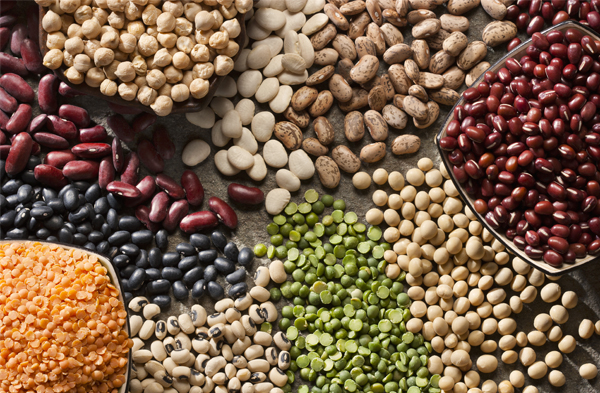Why are carbohydrates so controversial?
Carbohydrates are definitely up there with fats when it comes to controversial food groups with some people loving them and others taking every opportunity to espouse their harmful qualities. However, carbohydrates are classified as a ‘macronutrient’ which means that are essential for our survival but, if carbohydrates are so important, where does this negative image come from?
Simple carbohydrates vs. complex carbohydrates

A lot of the controversy circulating about carbohydrates actually relates to what are known as simple carbohydrates. You see carbohydrate can loosely be divided into two categories – simple carbohydrates and complex carbohydrates. Simple carbohydrates are more processed than their complex counterparts, often having their essential nutrients and fibre content stripped away and, because of this, they are high in sugar and quickly digested.
Complex carbohydrates, on the other hand, are not as processed and most of the time can be found in plant sources. They tend to be rich in fibre and dietary starch, containing high levels of vitamins and minerals. They are digested much slower than simple carbohydrates so the energy they release is more gradual and can keep you feeling fuller for longer.
The problem with simple carbohydrates
When people think of weight gain and blood sugar fluctuations, most of the time they are thinking of simple carbohydrates – this group encompasses cakes, crisps, white bread, white pasta and a whole host of other common snacks and food products. Unfortunately, carbohydrates as a whole end up getting muddied and everyone assumes that all carbohydrates are equally bad for your waistline and should therefore be avoided or restricted – hence the birth of the low carb diet!
Do low carb diets work?
Low carb diets such as the Atkins diet boast a high success rate but could restricting your carb intake really help you to shed the pounds? Well, the answer is yes, at least in the short term. Restricting your intake of simple carbohydrates is bound to make a positive difference to your health, however, giving up all carbohydrates as a whole can present some problems.
Firstly, if you’re not eating as many carbs as you used to, which food group has moved in to fill the void? Usually the answer lies in protein and fats and these are normally derived from animals which aren’t always the healthiest option. In fact, one recent study found that if you are going to follow a low carb diet, you’re better opting for one that replaces carbs with plant-derived proteins and fats.1
The other big problem with low carb diets is that there hasn’t been much research conducted into the long-term effects of following such a diet. In the short-term, it may help you lose weight but in the long-term scientists are now starting to say that a low intake of carbs, around 40% total energy intake, carries the same risk of premature mortality as a high intake.2
Ideally, as I’m always saying, you should aim for a moderate intake of complex carbohydrates complemented by plant-based proteins and healthy fats. The amount of carbs you need can also be dictated by how active you are – if you’re hitting the gym every other day, your recommended intake of carbs is going to differ compared to someone who is more sedentary.
Plant-based proteins, fats and carbohydrates
The chances are that most of you are at least familiar with a few sources of complex carbohydrates – for example, you probably know that wholemeal bread is a favourable alternative to white bread and that porridge is probably preferable to feasting on Lucky Charms every morning. However, plant-based carbohydrates can sometimes cause confusion and often the line between plant-based carb and plant-based protein can blur.
That’s why here I’m going to look at some of my favourite plant-based sources of complex carbohydrates, fats and proteins. This way you can get an idea about the type of foods you should be including in your diet if you want to slightly reduce your carb intake or at least lower the amount of simple carbohydrates present in your diet.

Legumes
Legumes are a versatile food group that include staples such as lentils, beans and peas. They also tend to be incredibly rich in both complex carbs and protein. In fact, it’s thought that one cup of boiled black beans could contain as much as 15g of protein! It also helps that legumes usually contain a decent amount of fibre too, helping to ease digestive problems such as constipation whilst also promoting satiety, meaning they can ward off those pesky hunger cravings. Did I mention that legumes also contain a whole host of vitamins and minerals?
My favourite legume recipes:
Lentil Ragu with Zucchini Noodles
Olive oil
Olive oil still comes out on top when it comes plant-based forms of fat. It contains plenty of healthy monosaturated fatty acids, including omega-3 and has natural antioxidant properties, helping to prevent free-radical damage – a major cause of premature ageing. It also helps that olive is anti-inflammatory too and may even be capable of protecting healthy LDL cholesterol and reducing your blood pressure. A pretty impressive resume so far! However, quality matters so always opt for extra virgin, organic olive oil and don’t overuse it – for more information about olive oil, please read my blog, ‘Our guide to the healthiest cooking oils.’
My favourite olive oil recipes:
Quinoa
Free from wheat and derived from seeds, quinoa is definitely on trend at the moment with many seeing it as a gluten-free alternative to traditional grains. Similar to legumes, quinoa is also another food where protein and carbohydrates mix but it has the added bonus of being very low in fat. It’s also believed that quinoa can help to increase your metabolism, which can go a long way towards losing weight. The seed also contains plenty of energy-boosting B vitamins and magnesium, an essential mineral for your mood and muscles and joints. It’s definitely one of my favourite super grains!
My favourite quinoa recipes
Nuts
When that mid-afternoon slump kicks in, it always helps to have nuts to hand to help to fight those irritating food cravings. Nuts are naturally high in healthy fats and protein as well as vitamins and minerals like vitamin E and magnesium. Many nuts also offer special health benefits – walnuts, for example, contain an omega 3 fatty acid, ALA, and are thought to reduce inflammation while almonds may help to reduce your cholesterol levels. Nuts are also incredibly versatile so you can incorporate them into a variety of dishes, from homemade trail mixes to energy balls and bars.
My favourite nut recipes:
Buckwheat
Buckwheat is a complex carbohydrate that has a low GI index and a high content of protein. It’s been eaten for years in the East but recently it’s made its way West and has so far been well received. It contains flavonoids like rutin which has potent antioxidant properties and can help your body to utilise vitamin C. Buckwheat also impressively contains all nine essential amino acids so it’s definitely worth including more of this complex carbohydrate in your diet.
My favourite buckwheat recipes:





 Looking for our products in a store near you?
Looking for our products in a store near you?
